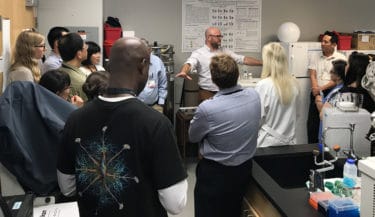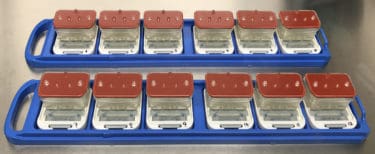UAMS Acquires Technology that Emulates Human Biologic Responses
| UAMS has acquired Emulate Inc.’s Organs-on-Chip technology, which simulates human biology so researchers can better understand how diseases, medicines, chemicals and foods affect human health.
The Chip technology can be used for studies on the liver, kidney, lungs and gut, as well as thrombosis and the blood-brain barrier.
For example, Emulate’s Liver-Chip can be used in toxicology studies and nutrient metabolism studies. UAMS hosted a demonstration of these uses in early September to familiarize faculty with the technology’s capabilities.

Emulate program manager and senior scientist Jacob Fraser introduces UAMS researchers to the Organs-on-Chip technology.
As part of the demonstration and seminar, Emulate program manager and senior scientist Jacob Fraser set up the first Liver-Chips on campus and trained the lab personnel who work with Igor Koturbash, M.D., Ph.D. Fraser gave a talk in Koturbash’s lab, followed by a seminar in a Biomed I conference room. Koturbash studies liver toxicity caused by drugs and dietary supplements, along with Mitchell McGill, Ph.D.

Emulate’s Organs-on-Chip technology allows researchers to test how human organs would respond to things like diseases, medicines, chemicals and foods.
Emulate also assists researchers who want to use their own specialized seed cells and any new designs. The company also helps with experimental data analysis. The company is working on chips for skin and the gut microbiome for future release.
Emulate aims for its products to replicate true-to-life human biologic response for the advancement of product innovation, design and safety with a range of applications, including drug development, agriculture, cosmetics, food and chemical-based consumer products.
For more information, contact ikoturbash@uams.edu.
